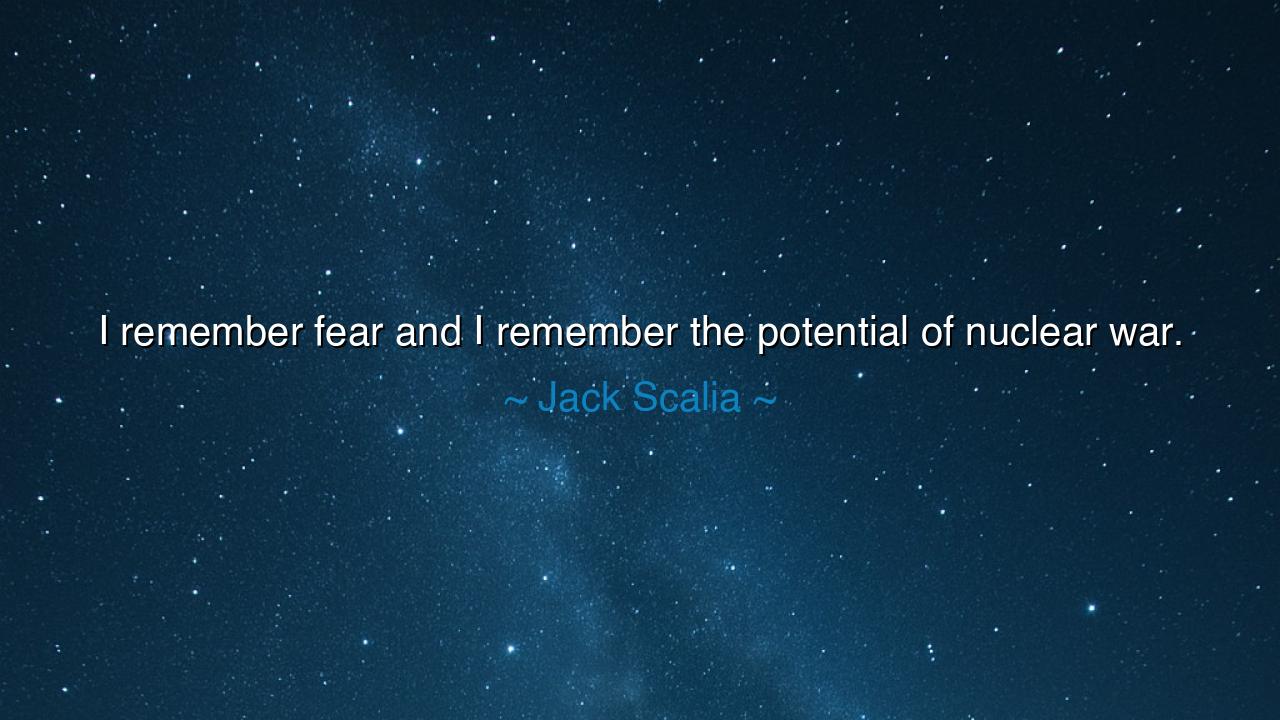
I remember fear and I remember the potential of nuclear war.






The words of Jack Scalia — “I remember fear and I remember the potential of nuclear war.” — summon the shadow that loomed over the second half of the twentieth century, a shadow that fell not only on soldiers and statesmen, but on every man, woman, and child who lived under the specter of annihilation. In these few words, Scalia recalls not just his own memory, but the memory of an entire generation who grew up in the Cold War, when the fate of humanity seemed balanced upon the thin thread of restraint.
To speak of fear is to acknowledge the ever-present dread that haunted daily life in those years. This fear was not of invasion alone, nor of ordinary battle, but of total destruction — fire raining from the skies, cities reduced to ash, the very earth poisoned. It was the kind of fear that lives not in moments but in the marrow of existence, shaping culture, politics, and even the dreams of children. It was a fear so deep that it became almost invisible, a background to life itself.
The potential of nuclear war was not abstract. It was made real by events that shook the world: the Cuban Missile Crisis of 1962, when the United States and the Soviet Union stood on the brink of mutual destruction. For thirteen days, the world held its breath, knowing that a single miscalculation could unleash Armageddon. Schoolchildren practiced “duck and cover” drills, as though wooden desks could shield them from atomic fire. The fear Scalia remembers was not imagined; it was lived, daily, by millions.
History reveals how close this danger came. In 1983, a Soviet officer named Stanislav Petrov refused to believe false alarms that American missiles were inbound. By choosing restraint over panic, he may have prevented a nuclear exchange that could have ended civilization. Such stories remind us that the fear of nuclear war was not paranoia but prudence, and that the survival of humanity often rested on fragile decisions made by individuals in moments of extreme tension.
Yet even in this climate of fear, humanity endured, and hope flickered. Treaties were signed, summits were held, and leaders on both sides eventually recognized that the path of nuclear fire led nowhere. The memory of fear became a teacher, urging caution and reminding nations of the cost of pride and rivalry. The potential of nuclear war, though never realized, shaped humanity’s understanding of its own fragility and its responsibility to protect life.
The deeper meaning of Scalia’s words is this: fear can be destructive, but it can also be instructive. To remember fear is to remember what is at stake, to be vigilant, to act with wisdom rather than recklessness. The fear of nuclear war was the crucible that taught the world the necessity of restraint, of dialogue, of building systems to prevent catastrophe. Without that memory, arrogance might rise again, and the same dangers might return.
The lesson for us is profound. We must not forget the fear that accompanied the nuclear age, for to forget is to repeat it. We must teach future generations that the weapons humanity forged have the power to unmake all life, and that the only true victory is to ensure they are never used. In our personal lives, too, we can learn from this: let fear not paralyze us, but sharpen us; let it remind us of the stakes and guide us toward wisdom and peace.
Thus let Scalia’s words endure as both memory and warning: “I remember fear and I remember the potential of nuclear war.” To remember is to guard against it, to honor the millions who lived beneath its shadow, and to commit ourselves to a world where fear need not be our constant companion, because wisdom and restraint have prevailed.






TSBinh Tinh Song
Scalia’s words make me reflect on how the fear of nuclear war has shaped not just history, but personal lives. Even in times when nuclear war was not an immediate threat, that fear was always there, simmering beneath the surface. How do we deal with this kind of existential fear in our own time? Does it shape our political decisions, or have we managed to push it aside in favor of other concerns?
TMNgo Tra My
The mention of nuclear war as a source of fear really makes me consider how this fear still lingers in the modern world. While the Cold War is over, the possibility of nuclear conflict is still a reality. How do we reconcile this fear with the everyday challenges we face? Is it something we push to the back of our minds, or does it influence our decisions in ways we might not even realize?
TDnguyen thuy duong
Reading Scalia’s quote, I’m reminded of how pervasive the fear of nuclear war was, especially during the Cold War era. It’s unsettling to think that such fear shaped entire generations. How does the possibility of nuclear conflict impact the way people approach their lives and their future? Is it possible to ever fully escape the psychological burden of knowing such power exists in the world?
GTGiangg T.
Scalia’s reflection on fear and the potential of nuclear war strikes me as a reminder of the existential anxiety that defined certain historical periods. How did the looming threat of nuclear conflict shape the way people lived, even during times of peace? I wonder if the fear of destruction changed our collective psyche or if it was something people just learned to live with, like an ever-present shadow.